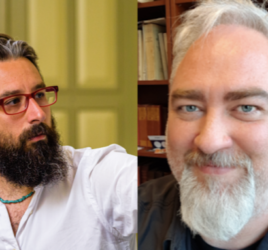
Lessons Learnt
Last year was an unusual teaching experience for me. Normally, before each semester starts, I like to have clarity on what courses I’ll be teaching and, just as importantly, how I’ll be teaching them. In January of 2019, however, I received the abrupt and unsettling news that the textbook I was scheduled to use as the backbone for a course that was starting a month later had suddenly become unavailable for purchase.
What followed was an accelerated path through all five Kübler-Ross stages of grief.
- Denial: “there must be some mistake; surely the publishers can make the book available somehow”
- Anger: “those m&^%*&^$’s; do they have no decency??”
- Bargaining: “what if I negotiated to have the pdf shared just this once?”
- Depression: “I don’t know how I’m going to manage this; this all feels like a tremendous mess”
- Acceptance: “I wanted to make big changes in this course anyway; perhaps I can see this as an opportunity rather than a disaster”
Fast-forward to a few weeks ago, when I received the amazing news that I was nominated as the Teacher of the Year for the Psychology Department. The experience leading up to it has been an emotional and intellectual rollercoaster, but, reflecting back on it, what stays with me today are a feeling of deep gratitude and a sense of having learnt a lot through this trial by fire. I thought it useful to share five of these lessons learnt with you, colleagues, students, friends.
-
You’re as ready as you’ll ever be
For years I had been slowly making plans for a radical shift in the content and teaching in this course (Research Methods, in case you were wondering). I had been patiently accumulating new material, interesting links and media, and coming up with ideas for how I’d like my ideal version of the course to be. It never seemed the right time for actual change, though; some other course would need more immediate attention, I was uncertain whether I had enough time to implement big changes, or reticent whether they would bring the improvements I had hoped for, etc., etc. In hindsight, I realise now that, while some obstacles are real, many turn out to be imagined, or simply borne out of fear of failure. What this experience taught me is that often the best way forward is to make that leap and trust in yourself and your skills to see you through the experience. In the end, these are some of the changes I made in the course:
- ditch textbooks altogether and structure the course around articles
- focus on formative assessment methods to increase student attainment
- re-work the summative assessment methods
- switch the focus of the course content to more contemporary issues of psychological research methods
They were challenging to make in the short amount of available time, but they were clearly feasible and valuable. Perhaps there is some aspect in your own teaching or learning that you want to change but feel you are not ready for yet? It could be that the right time for you is also now.
-
Find support in your community
This lesson was a hard one. I don’t take easily to sharing tasks, rather I prefer to take on everything myself. Letting go and admitting that this is no longer possible was cathartic and turned out to be key in the success of this course. Thankfully, this lesson was followed by another one: Support is there, if you seek it. I am indebted to a number of individuals who helped through the process of successfully redesigning this course. First, Sabine Otten, the Director of Education in our Department, who was willing to offer meaningful support on short notice (Sabine, thank youf or helping recapture a sense of security in an otherwise tumultuous semester!) Calum Guthrie, who assisted in figuring out the right approach and material to offer our students (Calum, this was truly the most rewarding experience preparing for a course, thank you!) Jolien Mouw, friend and colleague in Educational Sciences, whose guidance in our Professional Learning Communitywas inspirational and opened up many new worlds (thank you, Jolien, and to everyone who participates in this group!) And, certainly not least, to my friends and family who saw me disappear for months last winter. Without your understanding and patience this would have been a much less pleasant experience (and, yes, in the end, this was a pleasant experience – or is that just cognitive dissonance?)
-
Burn the box!
I don’t know if this is a feeling shared by many colleagues at the University, but it has certainly seemed to me that there is a very narrow range of options when it comes to offering a course. Often the constraints are practical and may relate to the large number of students in a course or the limited availability of teaching rooms; certainly, these are matters to keep in mind. Other times, however, the perceived lack of options simply reflects a lack of inspiring examples or experience. Stepping out of the proverbial box frees you up to imagine new ways of creating a course that allows students to meet the learning objectives in a way that is both more effective and more motivating. In the example from last year, stepping away from the default option of a textbook for an undergraduate course or rethinking the notion of assessment purely as an end-of-semester component were valuable in increasing student engagement.
In this too, the value of the community around you cannot be overstated! We have many dedicated, creative, and inspiring teachers in the Faculty and we would all benefit from strengthening our communication with each other, either through the Professional Learning Communities or other means. I hope to be able to help accomplish this in the coming years; more on this in another post!
-
Embrace change
I don’t know about you, but it seems to me that it is easy to slowly become more complacent with every year you deliver a course to a new group of students. Things are running well and you know what you teach so intimately that it is tempting to keep things the same, year after year. There is merit in this, of course! Proficiency is partly the outcome of repetition and it’s certainly more efficient to stick to what you know works well. And yet the downside is that you risk gradually losing engagement and enthusiasm. That spark of the enthusiasm that I associate with good teaching becomes more precarious, as the years wear on. As dramatic as the need for change was last year, it was also refreshing and gave me new perspectives on material I thought I knew intimately. And though I don’t intend to shake things up so much every time I give a course, I realise that some focused annual reworking makes giving the same course an altogether new and more engaging experience.
-
If you build it, they will come
In a recent discussion on how to stimulate students’ development, a friend suggested that “you get the results you organise for.” This struck a chord with me. It is not uncommon to hear teachers gripe that their students are unwilling to work hard or to engage with the material, their fellow students, and their teachers. Somehow, that always seemed like the easy way out for me and a depressing thought, to boot. Even if it is true that students are less “activated” (whatever that catchphrase means to everyone) today than in the past (though, I suspect many of us have rose-tinted memories of our own student years), I cannot imagine there’s much to gain from back in my day thinking (nor do I find this to be true.) Instead, we catch up with the changes in our students’ needs and circumstances. We figure out new ways to structure our students’ learning, give them meaningful context for the information they have to integrate, and offer timely, useful feedback on their development. My impression is that students don’t shrink away from challenges, but from cynical educational methods. A couple of semesters of exams that are tuned to fact memorisation only and what we have created is unengaged fact-memorisers. If we want that to change, we should be carrying the torch, making meaningful changes to how we approach the design of our courses to stimulate the kind of learning we do want to see. Our students will be happier, more motivated, more effective learners; and we more fulfilled teachers. This was my experience from last year. Let’s go out together and build it.




